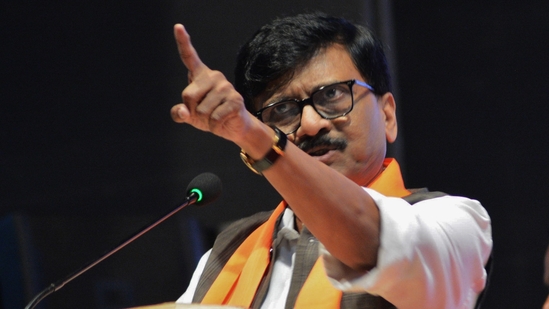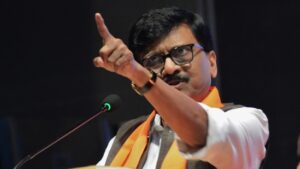Shiv Sena (UBT) MP Sanjay Raut is addressing workers of the party in Mumbai. (Praful Gangurde /HT file)
In the wake of the devastating Pahalgam terror attack on April 22, 2025, which claimed 26 lives, mostly tourists, political discourse in India has intensified. Shiv Sena (UBT) leader Sanjay Raut has sparked controversy by criticizing Prime Minister Narendra Modi’s handling of the crisis, particularly focusing on his body language and public engagements. This article delves into Raut’s remarks, the broader context of India-Pakistan tensions, and the government’s response to the attack, providing a comprehensive overview of the unfolding situation.
Background of the Pahalgam Terror Attack
The scenic town of Pahalgam in Jammu and Kashmir became the site of tragedy when four armed terrorists, reportedly linked to The Resistance Front (TRF), an offshoot of the Pakistan-based Lashkar-e-Taiba, launched a brutal attack. The assault targeted civilians, including tourists visiting the region during the spring season, resulting in one of the deadliest attacks in recent years. The incident has reignited demands for a strong retaliatory response against Pakistan, which India accuses of supporting cross-border terrorism. Prime Minister Modi has vowed to deliver a “crushing blow” to terrorism, granting the armed forces full operational freedom to determine the mode, targets, and timing of India’s response.
The attack has not only heightened national security concerns but also escalated diplomatic tensions between India and Pakistan. Measures such as India’s suspension of the Indus Waters Treaty and bans on Pakistani imports and maritime access underscore the severity of the situation. Amid these developments, political leaders across the spectrum have weighed in, with Sanjay Raut’s remarks drawing significant attention.
Sanjay Raut’s Critique of PM Modi
Sanjay Raut, a prominent leader of Shiv Sena (UBT), addressed the media in Pune on May 3, 2025, where he launched a scathing critique of PM Modi’s approach to the crisis. Raut expressed skepticism about the Prime Minister’s commitment to addressing the Pahalgam terror attack, pointing to his public appearances as evidence of misplaced priorities. “I’m no defense expert, but the Prime Minister’s body language doesn’t reflect the gravity of a nation preparing for a serious response,” Raut remarked, highlighting Modi’s participation in a campaign rally in Bihar and his attendance at the World Audio Visual and Entertainment Summit (WAVES) in Mumbai shortly after the attack.
Raut argued that a leader steering a country through a potential conflict should remain focused on national security, not engage in electioneering or high-profile events. He further demanded the resignation of Union Home Minister Amit Shah, attributing the attack to a “security lapse” under Shah’s leadership. “For every terror incident in Kashmir over the past decade, Amit Shah bears responsibility,” Raut asserted, questioning why Modi continues to retain him in the cabinet.
Opposition’s Stance and Political Reactions
Raut’s comments reflect broader sentiments among opposition leaders who have expressed frustration with the government’s handling of Jammu and Kashmir security. While opposition parties have voiced support for a united response to the attack, Raut criticized the government for what he perceives as empty rhetoric. “Defence Minister Rajnath Singh talks of entering Pakistan to wipe out terrorists, and Amit Shah promises to hunt them down. Who’s stopping them?” Raut challenged, urging the government to act decisively rather than rely on war rhetoric for political gain.
Other political figures have also engaged in the discourse. Jammu and Kashmir Chief Minister Omar Abdullah met with PM Modi on May 3 to discuss the regional situation, emphasizing the need for robust security measures. Meanwhile, Andhra Pradesh CM N Chandrababu Naidu praised Modi’s resolve, noting his attendance at public events as a sign of unwavering commitment despite the tragedy.
India’s Response to the Pahalgam Attack
The Indian government has taken several steps in response to the attack, signaling a hardline stance against Pakistan. At a high-level security meeting on April 29, PM Modi reiterated India’s commitment to combating terrorism, stating, “We will identify, trace, and punish every terrorist and their supporters.” The armed forces have been granted autonomy to devise a strategic response, with top defense officials, including Rajnath Singh and National Security Advisor Ajit Doval, actively involved in planning.
Beyond military measures, India has implemented economic and diplomatic actions. The suspension of the Indus Waters Treaty and restrictions on water flow through the Baglihar Dam on the Chenab River have drawn sharp criticism from Pakistan, with its Defense Minister Khawaja Asif warning of retaliatory strikes. Additionally, India has banned all imports from Pakistan, restricted Pakistani ships from docking at Indian ports, and blocked social media accounts of prominent Pakistani figures, including PM Shehbaz Sharif’s YouTube channel.
International Reactions and Diplomacy
The Pahalgam terror attack has garnered global attention, with several countries expressing solidarity with India. The United States has emerged as a key supporter, with the Trump administration affirming its backing for Modi’s anti-terrorism efforts. US Secretary of State Marco Rubio urged both India and Pakistan to pursue dialogue to de-escalate tensions, while emphasizing accountability for the attack’s perpetrators. Other nations, including Angola and Russia, have condemned the attack, with Russian Foreign Minister Lavrov discussing bilateral cooperation with India’s S Jaishankar.
However, Pakistan has denied involvement, with PM Shehbaz Sharif calling for a transparent international investigation. Sharif described Pakistan’s response to India’s actions as “responsible and measured,” while alleging that India has failed to provide evidence linking Pakistan to the attack. These conflicting narratives have further strained India-Pakistan relations, raising concerns about the potential for military escalation between the two nuclear-armed neighbors.
Escalating Tensions and Regional Implications
The attack has significantly altered the security landscape in Jammu and Kashmir, with the Border Security Force (BSF) apprehending a Pakistani Ranger along the Rajasthan border and Pakistan reporting multiple ceasefire violations along the Line of Control (LoC). The region, once bustling with tourists, now wears a deserted look, as fear and uncertainty grip local communities. The European Union and other international bodies have called for restraint, urging both nations to prioritize dialogue over conflict.
Comparisons of India and Pakistan’s military and nuclear capabilities have surfaced in media discussions, with India’s defense capabilities far surpassing those of Pakistan. However, the prospect of a full-scale conflict remains a global concern, given the nuclear arsenals of both nations. Defense experts have warned that Pakistan’s fragile economy could collapse under the pressure of war, further complicating the regional dynamics.
Public Sentiment and Media Coverage
Public sentiment in India is marked by outrage and demands for justice. Social media platforms have been abuzz with reactions to the attack, with some users praising Modi’s leadership and others echoing Raut’s criticisms. The blocking of Pakistani celebrities’ social media accounts, such as those of Fawad Khan and Atif Aslam, reflects the heightened nationalist sentiment in India. Media outlets, including Hindustan Times, have provided extensive coverage of the attack and its aftermath, keeping the public informed on developments.
Conclusion: Navigating a Complex Crisis
The Pahalgam terror attack has thrust India into a challenging period, marked by heightened security concerns, diplomatic tensions, and political debates. Sanjay Raut’s critique of PM Modi underscores the opposition’s demand for accountability and decisive action, while the government’s multifaceted response signals its intent to address the crisis head-on. As India navigates this complex situation, the international community watches closely, hoping for de-escalation and a resolution that prioritizes peace and stability.
Call to Action: Stay updated on the latest developments in the Pahalgam terror attack and India-Pakistan tensions by subscribing to our newsletter. Share your thoughts in the comments below and join the conversation on how India should respond to this crisis. For real-time updates, follow us on social media!




